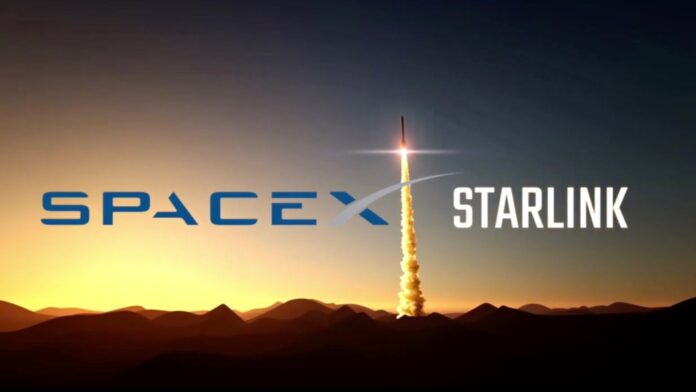Elon Musk’s SpaceX’s Starlink satellite internet project is faster than its retail competitors, according to data from Ookla Speedtest Intelligence. But then again, nobody is really using it yet.
The first tests from SpaceX’s Starlink internet project show average speeds of up to 70 megabits down, consistent with an exclusive analysis of Ookla Speedtest Intelligence data from PCMag.
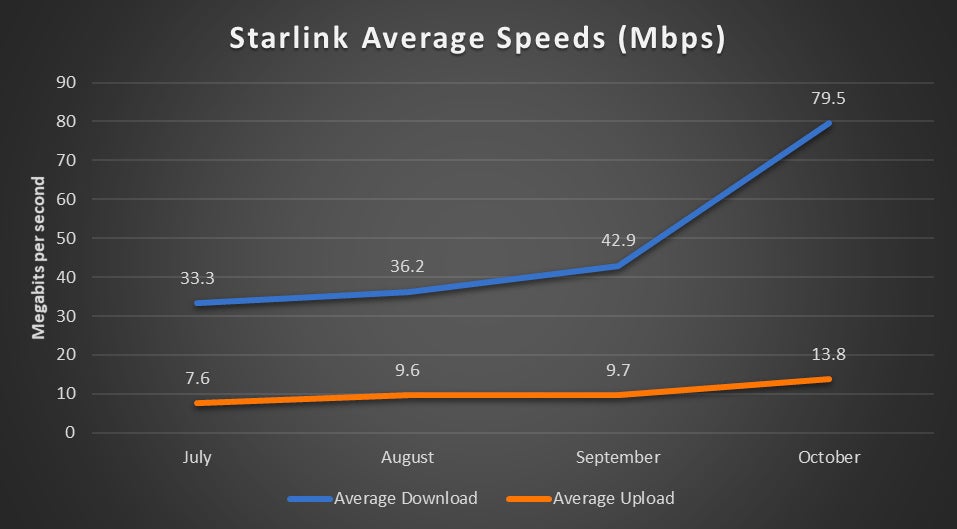
Starlink beta invites went out in the week, but Speedtest Intelligence has been collecting data thereon throughout its development period, which they only released to us. The system currently has 895 small, relatively low-flying satellites within the sky and aims to eventually deploy 12,000 of them.
The company quoted speeds of “50Mb/s to 150Mb/s” during a recent email to trial users, therefore the results we’re seeing are by and enormous in line thereupon.
Starlink speeds have canted sharply upwards in recent months because the project gets closer to launch.
Currently, Starlink is joining HughesNet and Viasat’s Exede as a last-resort internet service provider for rural users who can’t get cable or fiber. Starlink’s speeds are an enormous skip of existing satellite systems. consistent with Speedtest Intelligence, in October 2020 HughesNet averaged 19.84Mbps down while Viasat’s Exede system averaged 24.75Mbps down.
The difference in upload speeds is even more stark. In September, HughesNet averaged only 2.64Mbps up while Exede averaged 3.25Mbps.
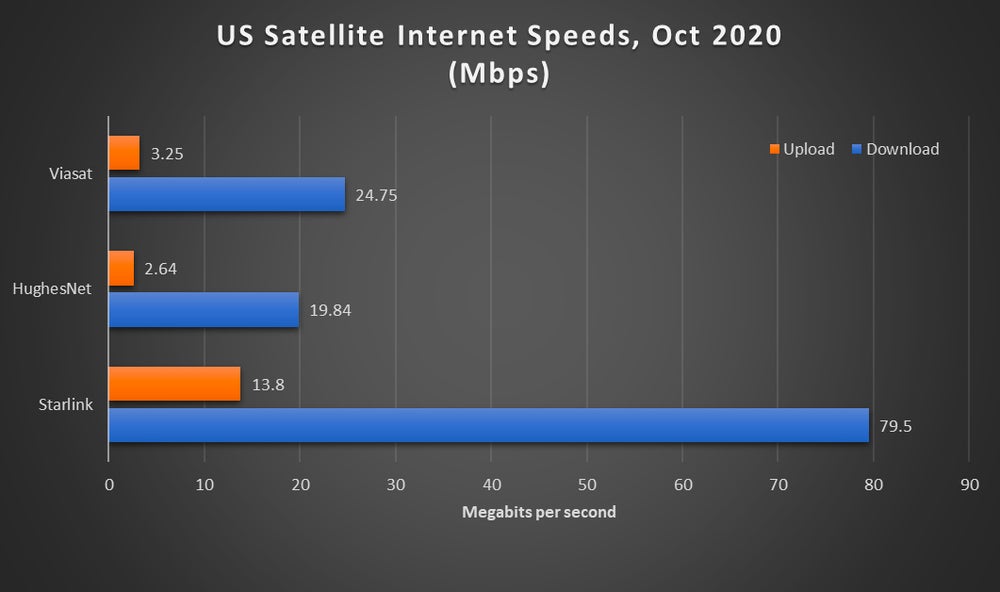
Starlink speeds easily exceed Exede and HughesNet.
Starlink’s real win, though, is on latency. Latency in recent tests varied wildly but averaged at 42ms. That’s for much longer than wired internet systems but shorter than HughesNet and Exede, which averaged 728ms and 643ms in September, respectively. the corporate says it expects “to achieve 16ms to 19ms by summer 2021.” 4G LTE is currently within the 40ms range for latency, consistent with Speedtest Intelligence data. My home fiber connection gets 2-3ms latency.
The combination of uplink speeds and latency is extremely important for our video-chatting world. Participating in Zoom calls requires both a transparent uplink and comparatively low latency, which suggests it has been very difficult for people using existing satellite connections. Starlink could bring rural users far better remote learning capabilities.
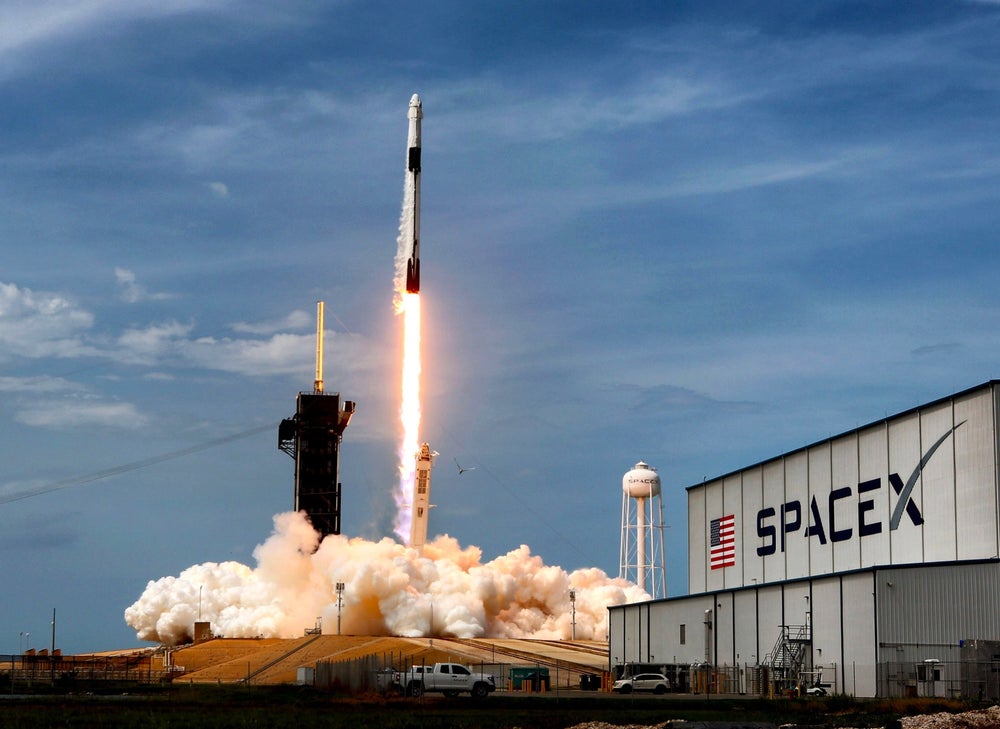
June Starlink satellite launch
Image credit: Joe Burbank/Orlando Sentinel/Tribune News Service/Getty Images
Lower latency is one of the large advantages of the new “low earth orbit” satellite systems. Starlink’s many small satellites orbit at about 340 miles above the world, while the satellites for HughesNet and Exede are up at 22,000 miles. So it takes much longer for a sign to urge up to and backtrack from the older-model satellites.
But satellite internet service still comes at a high cost: $99/month in Starlink’s beta phase, plus $499 for the satellite dish and Wi-Fi router. there is no word on data caps for Starlink, but in any case, it’s in beta.
The HughesNet 20GB, 25Mbps plan costs $69.99/month. Viasat’s 12Mbps unlimited plan, with 40GB of knowledge before deprioritization, costs $100/month; its 30Mbps plan costs $200/month.
Disclosure: Ookla is owned by the PCMag parent company, Ziff Davis.
SpaceX’s Starlink: First public beta results looks good
SpaceX’s Starlink internet public beta – dubbed the ‘Better Than Nothing Beta’ test – began last week and therefore the first results are beginning to appear.
The Starlink service currently costs $99 a month with a $499 startup fee for the user terminal, a tripod, and a Wi-Fi router.
Starlink told its early internet beta testers “expect to ascertain data speeds vary from 50Mbps to 150Mbps and latency from 20ms to 40ms [milliseconds] over subsequent several months as we enhance the Starlink system. there’ll even be brief periods of no connectivity at all”.
The service is feasible during a range between 44º and 52º degrees north latitude, while the beta is initially targeting rural residents in select regions of the northern US and southern Canada.
Reddit user FourthEchelon19, who posted a screenshot of his or her Starlink beta invite last week, over the weekend shared an image of the user terminal dish and tripod, and detailed a number of their early experiences with SpaceX’s low-Earth orbit satellite broadband service, delivered from nearly 800 satellites.
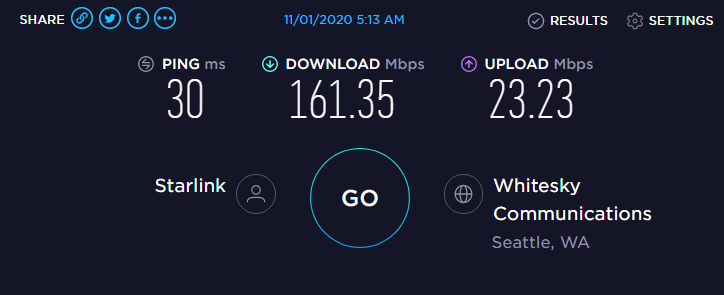
The account of the experience does line up with SpaceX CEO Elon Musk’s claims about it. That is, that Starlink will offer a low-latency service with higher broadband speeds than that offered by many ISPs in rural US areas.
FourthEchelon19 posted a picture showing what he or she said maybe a typical result on Speedtest.net of 134Mbps download speeds and 14.8Mbps upload speeds with a latency of 34ms.
Another test is shared on Speedtest.net had a latency of 41ms, 97.14Mbps download, and 18.6Mbps upload speeds. Speedtest says an honest latency for enjoying online games is from 0ms to 0.59ms, while a suitable latency is between 60ms and 129ms.
FourthEchelon19 also reported experiencing a “couple of interruptions, probably from satellite transitions, but almost 100% steady since initial setup” which it’d been “streaming 1,440p and 4K with zero buffering on YouTube”. The interruptions last about 10 to fifteen seconds and happen every jiffy.
In a later post, FourthEchelon19 added that he or she had played around in Modern Warfare with latency averaging 43ms, which got as high as 70ms for a few seconds, and as low as 35ms.
“Very solid and consistent enough to play easily. After an extended round, there are some interruptions, which cause latency infrequently, these are likely satellite handoffs, which should be less noticeable as more are deployed,” FourthEchelon19 wrote.
Responding to the Reddit post because it was shared on Twitter, Musk said Starlink’s latency and bandwidth will improve “significantly soon”.
In the invite to public beta testers, Starlink said by the summer of 2021 the service will achieve a latency of between 16ms and 19ms, but that might plan it launches more satellites, installs more ground stations, and improves its networking software.















